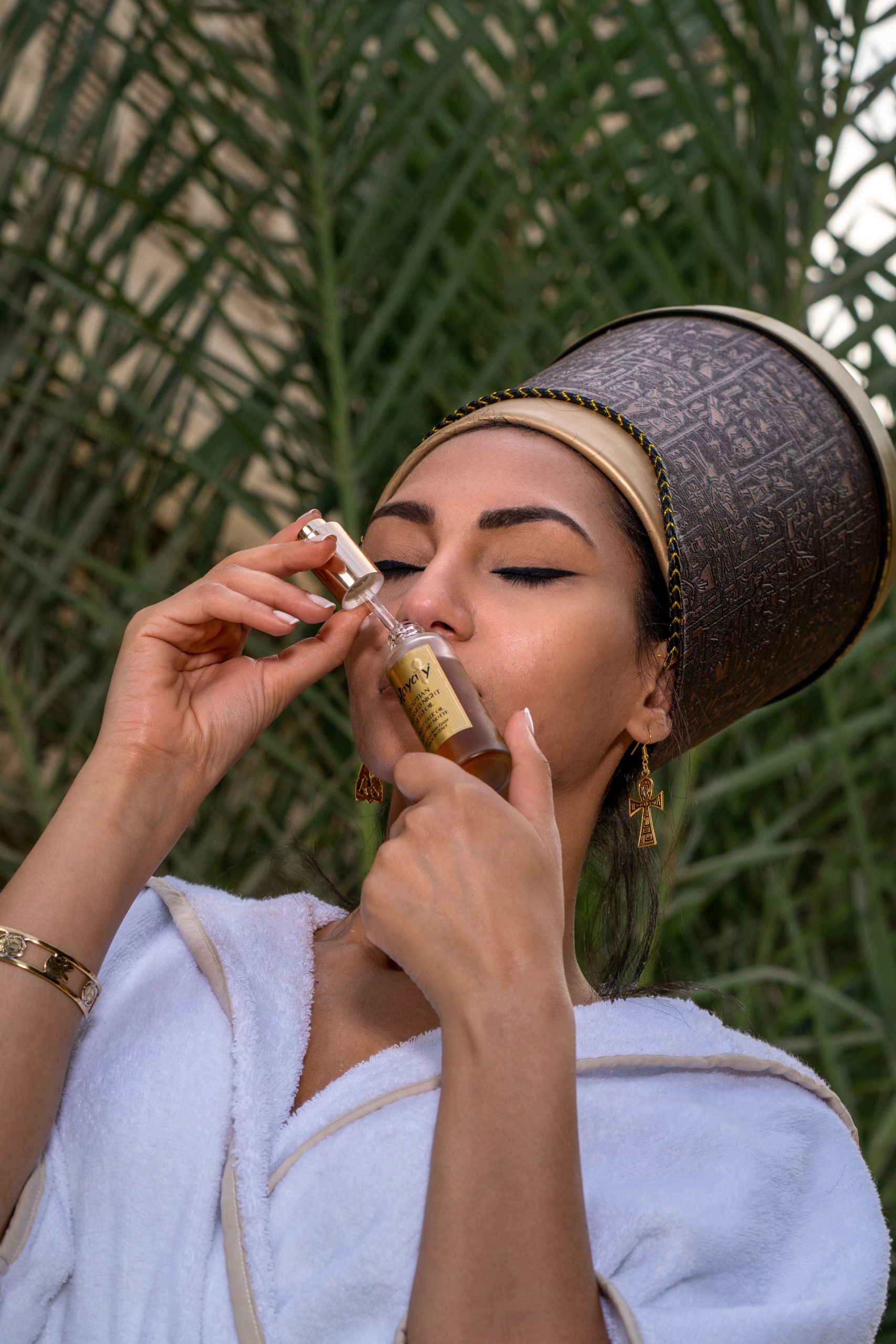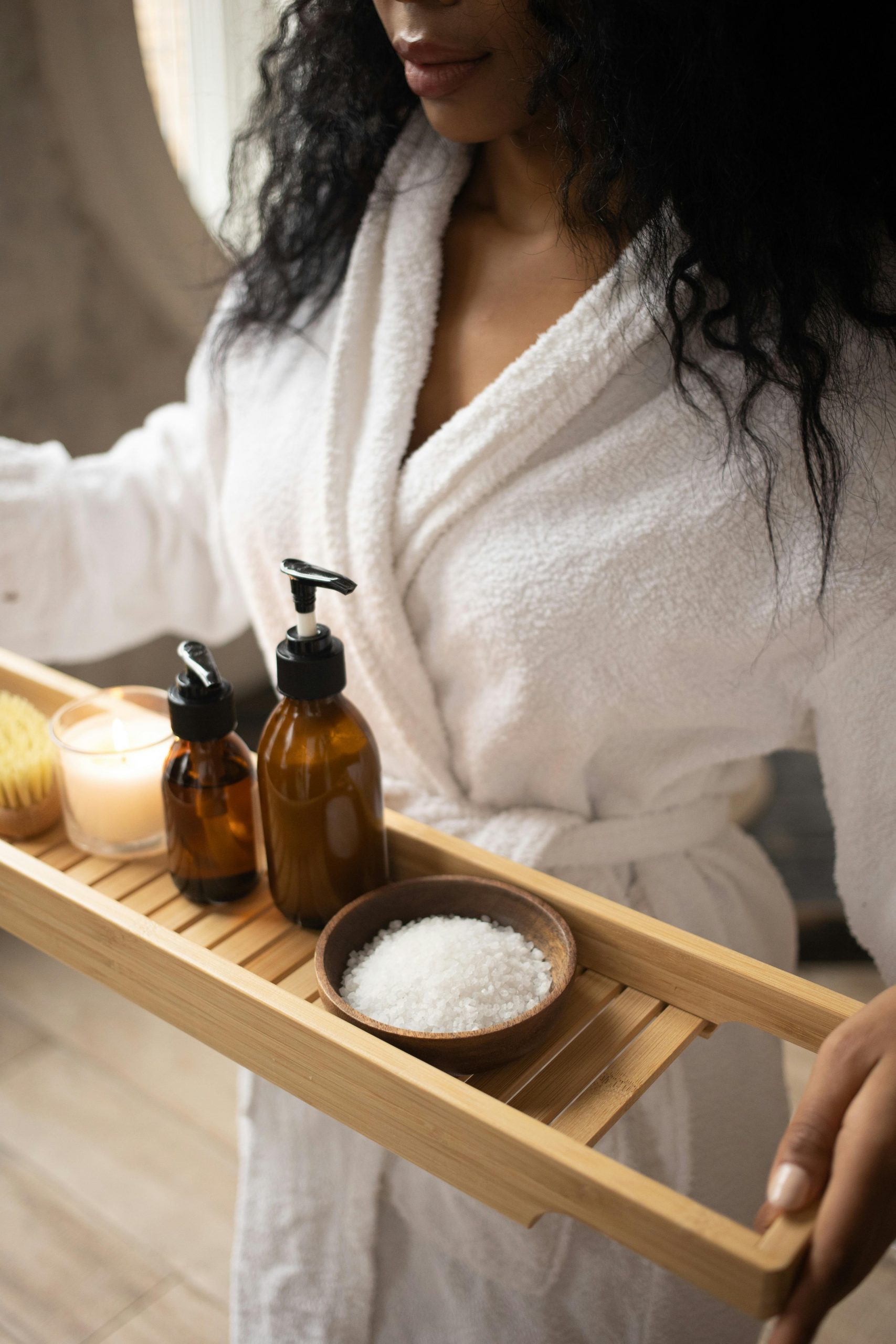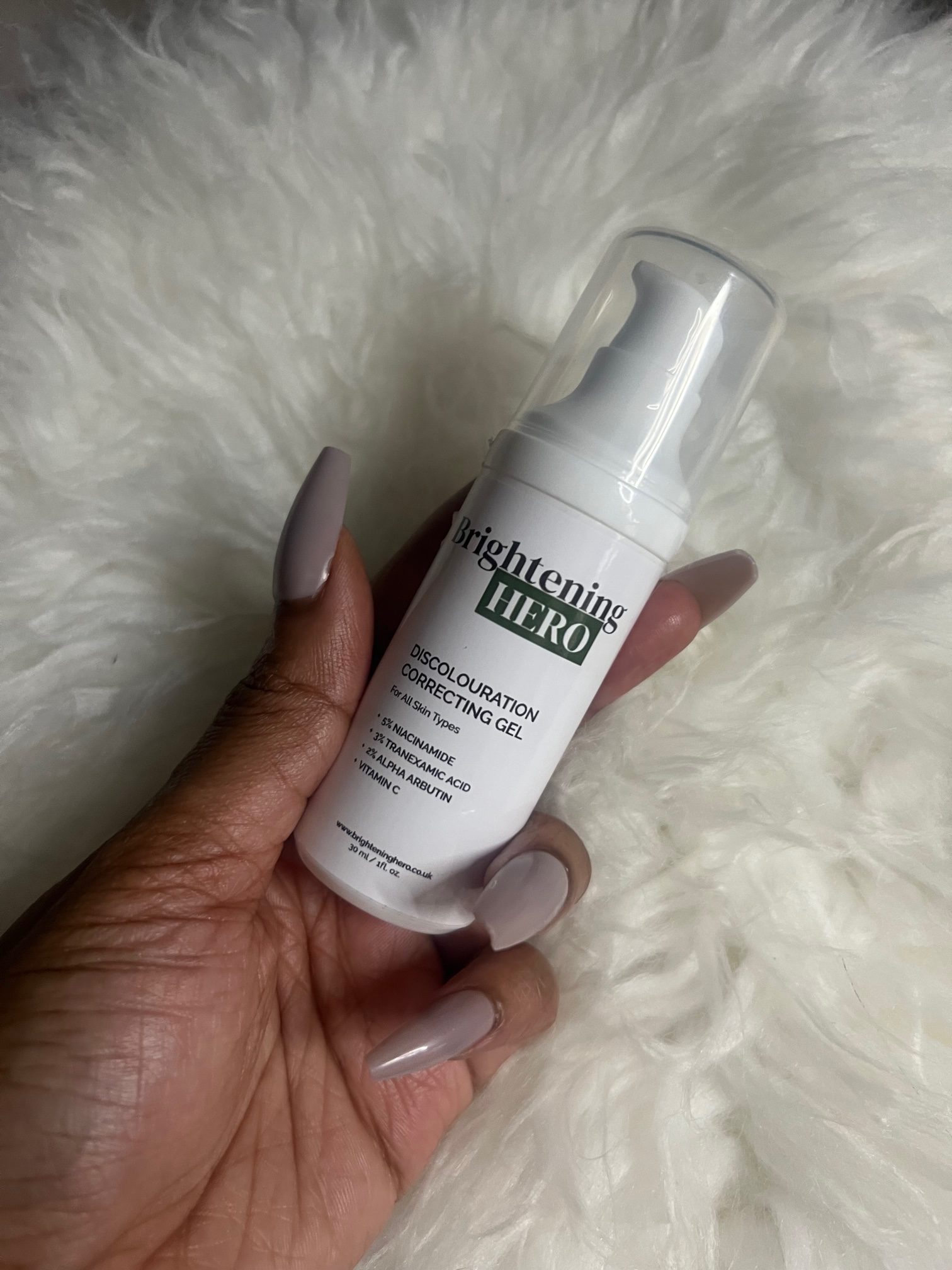
The recent heatwave may be behind us, but there is still plenty of summer sun in store – especially for those with foreign holidays to look forward to. Most of us love the sunshine and hot temperatures, but we need to be careful about overexposure – always use a high factor SPF on your face. So, what else can we do to look after ourselves this summer? How about taking a lead from some people who were experts at protecting their skin from the ravages of the sun: the ancient Egyptians.
1. Feed your skin from the inside

The ancient Egyptians firmly believed that if you eat well, you look well. Hieroglyphics on ancient Egyptian walls left behind a record of what they ate and drank. Beekeeping began there as early as 2400 BC. They loved their honey.
In 450 BC Greek historian Herodotus wrote that ‘Egypt was a gift of the Nile.’ When this great river used to burst its banks annually, the receding waters left a black, fertile mud, rich in minerals. An abundance of pomegranate, dates, grapes, watermelon, garlic, cucumbers, carrots, celery and peas grew, as did dates. With a diet like that, the ancient Egyptians were feeding their bodies and their skin with a rich source of antioxidants, protein and fibre.
2. Cleanse

Egyptian queens Cleopatra and Nefertiti were known for their love of milk and honey baths and the combination does make a great cleanser, leaving the skin soft and silky. However, that’s not practical, or environmentally sound in today’s world. You could use a substitute like coconut milk mixed with warm water but better still check out cleansing products containing hydroxy and lactic acid. Milk is rich in lactic acid and listed in many skin care products (AHA). It helps remove dead skin cells and stimulates new cell growth.
Olive oil was also a favourite of the ancient Egyptians who spread it all over their skin to stick to the dirt before scraping it off. The Ebers Papyrus instructed people to mix animal and vegetable oils with alkaline salts for washing and the olive oil soap we buy today is known for its lower pH than mainstream soaps that can dry and irritate the skin. It’s deeply nourishing, moisturising and anti-oxidant rich. A very gentle cleanser that can be used on the face without stripping out its natural oils.
3. Exfoliate

Credited with the first exfoliation techniques, the Egyptians used a combination of pumice stones and scrubs made from sand or plants such as aloe vera. Natron (sodium carbonate) mixed with water was used as a scrub. A gentle substitute for Natron is modern baking soda. It’s a mild exfoliator but shouldn’t be done more than once a week. You could also try many of the mineral sea salt scrubs on the market or alternatively, look out for a good Egyptian organic loofah. It’s not too hard or soft, the perfect texture for a good scrub. Be warned, it has an earthy, muddy smell but you get used to it and those who use them for the first time say they feel like they have never showered before. They are sold by men with carts on the street all over Egypt, but they are just as easily found online or in good, organic health shops.
4. Masks/Moisturise

The nourishing effects of aloe vera were documented in the Eber Papyrus as far back as 1550 BC. But its reference as the ‘plant of immortality’ was not because it makes you live for ever, but its multiple uses. Cleopatra and Nefertiti were believed to have used it on their faces as a nourishing and tightening mask.
The plant has more than 75 nutrients including Vitamins A, C and E and B12 and amnio acids. As well as being anti-inflammatory, it is super hydrating, reduces swelling, stimulates collagen production and increases the rate of healing, especially after sunburn. The Egyptians depicted the plant all over their temple walls.
There are myriad products on the market containing aloe vera but the simplest thing is to get a plant from any garden centre, cut open the leaf, scoop out the sticky gel inside and apply to the face. Rinse off with warm water after around 10 minutes for firm, smooth and beautifully moisturised skin. Alternatively for very dry skin, Shea butter was a big part of ancient Egyptian civilisation. Anthropologists discovered it was the go-to for skin disease. It contains huge amounts of fatty acids to moisturise and soothe and it also protects against short waves of blue light.
5. Oils

Soaking up the summer sun can leave skin parched. The ancient Egyptians (who had access to more than 20 essential oils, according to the Ebers Papyrus), slathered themselves in pungent oils to keep their skin from drying out in the fierce desert heat. Frankincense, cedar, lupin, black seed, rose, fenugreek and sesame can all be bought individually and added to a carrier massage oil such as sweet almond or look for the ingredients on commercial moisturising oils.
*Frankincense: One of the seven sacred oils on display in the Museum of Cairo, this was central to worshiping the gods and was burned to rid the air of bacteria. Historically used for scars, the Ebers Papyrus notes its ‘superior wound healing effects’ its powerful antioxidants are believed to slow down the ageing process, especially on mature skins – so look out for it as ingredient when buying night repair creams. It also smells amazing.
*Lupin Seed: The first oil recorded in ancient Egypt where it was used to protect against sunburn. Rich in antioxidants, it promotes elasticity, nourishes, hydrates and illuminates. Look out for this ingredient in your skincare products as it will give your skin a wonderful glow.
*Black Seed: Nutrient dense and anti-inflammatory. Used in ancient Egypt to treat bites and rashes. Can also help to clear eczema, acne and psoriasis. Archaeologists point to its great significance for protection and healing after finding the seeds in Tutankhamun’s tomb. This wonder seed is so versatile and has so many benefits that it should be a ‘must have’ in any skincare product you choose.
*Sesame: Listed in the Ebers Papyrus as Sesemt, baskets of sesame were found in King Tutankhamun’s tomb. It was used to treat inflammation and today its anti-microbial properties are used for fighting acne.
*Fenugreek: One of Cleopatra’s favourites. Slows the signs of ageing.
*Rose: This flower was incredibly important to the ancient Egyptians as they believed it had powerful healing and aphrodisiac properties. They would boil down roses to use as a skin balm. It was the symbol of the Egyptian Goddess of Love, Isis, and depicted on many works of ancient Egyptian art. It’s a great skin moisturiser and the scent reduces anxiety.
Many of the skin care rituals we practice today are thought to have originated in Egypt more than 5,000 years ago. The ancient Egyptians were obsessed with health and beauty, but their simple, holistic routine is just as fitting for the environmentally conscious 21st Century.
ABOUT THE AUTHOR

Randa Zaid is founder of Hayaty Natural, a genderless skincare brand inspired by the wisdom of the ancient Egyptians. Using medicinal botanicals like Black Seed (so beloved of the Ancient Egyptians they called it the ‘blessed seed’) and a combination of plant-based ingredients sourced from local communities in Randa’s homelands of Egypt and Italy, each formulation follows ancient recipes developed by the Pharaohs to provide an holistic approach to self-care. Hayaty is Organic, Vegan, Fairtrade, Cruelty- and GMO-free. Packaged in recyclable glass and card, each bottle comes with a hand-made Egyptian papyrus to inspire us to love ourselves and our environment.
Website: https://hayatynatural.uk
Facebook: https://www.facebook.com/hayatynatural
Instagram: https://www.instagram.com/hayatynatural/
TikTok: https://www.tiktok.com/@hayatynatural
LinkedIn: https://www.linkedin.com/in/randazaid/
Sources:
- Ebers Papyrus circa 1550 BC
- Edwin Smith Papyrus
- Bitter almonds are banned in the UK due to their cyanide content but sweet almond oil is used widely today to improve the complexion
- Heredotus. Historian and philosopher
- https://www.gardenia.net/plant/aloe-barbadensis-barbados-aloe
- https://www.nccih.nih.gov/health/aloe-vera
- https://www.webmd.com/diet/ss/slideshow-black-seed-oil-benefits
- https://en.m.wikipedia.org
- http://www.agbangakarite.com/shea_history.php
- http://flowerlinka.com
- TAGS ― Beauty Blogger, black bloggers, Cleanse, Egyptian skin care, Egyptian skin care benefits, exfoliate, Feed your skin, Hayaty Natural, Healthy skin, iamsashashantel, lblogger, lbloggersuk, Lifestyle, Lifestyle Blogger, london based blogger, Masks, moisturise, Natural Skincare, Oils, Randa Zaid, Sasha Shantel, SashaShantel.com, Skincare products, UK blogger

Embrace the Glow: A Guide to Oily Skin Care for Women
I have written so many posts on oily skin over the years because I am so compelled to find different and new ways to manage this skin type. I can’t express how many times I have felt defeated when an almost flawless look was quite quickly ended with my sweaty pores peeping through. I have battled with my oily skin for a very long time, however by experimenting and trying different products and reviewing diverse skincare methods, I finally feel in control of my skins overall look and I now barely have any breakouts.

5 Reasons Why You Should Embrace Organic Skincare
Hey my loves, are you ready to elevate your skincare game to the next level? It’s time to embrace the wonders of organic skincare and let your skin soak up all the goodness nature has to offer. You may not believe it but on the 17th of this month I turn 39! the reason why this gets an exclamation mark is simply because; on a daily basis, so many people compliment me on how young I look and how good my skin looks and to be completely honest with you; the main reason why my skin is thriving at the moment is because I now use many more organic beauty products. So now the cat is out of the bag, here are five fabulous reasons why jumping on the organic skincare bandwagon is the best decision you’ll make for your skin:

Unveiling Radiance: Brightening Hero, A Comprehensive Review
In the quest for radiant skin, we often find ourselves navigating through a maze of beauty products, hoping to stumble upon the holy grail. Enter Brightening Hero – a beacon of light in the realm of skincare. Having put it to the test for a solid two weeks, I can confidently say, this product is more than just a mere skincare staple; it’s a transformative experience.







